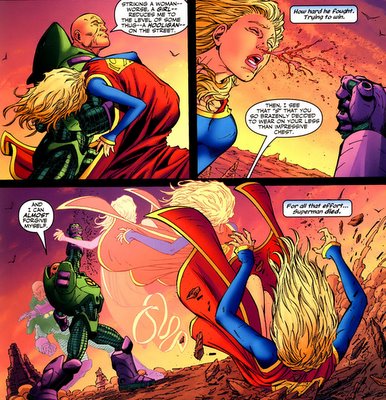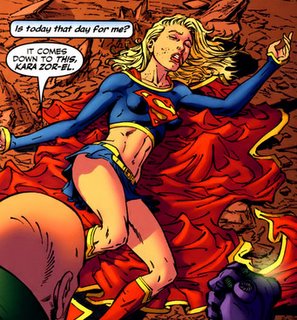It seems unlikely that the 7 minute Batgirl show was a test for an actual Batgirl series as it introduces both Batgirl and Barbara Gordon as new characters meeting Batman for the first time. It also heavily features the Batman cast, but it's basically one scene, set in the library where Barbara works, which will need to close for renovation by the end of it. My guess is that it was a test or sample of some sort to pilot the third season of Batman, which first introduced the "dominoed dare-doll" *cringe*.
 I haven't watched any episodes of the show in years, so I couldn't say if there are any changes between this presentation of Batgirl and how she appears in the Batman show, except for one thing; the Batgirl motorcycle that Sleestak exposed us to recently on Lady That's My Skull is not the one in this show. This one has some bat-customisation (including a windscreen at such a low angle that a jolt forward would be liable to cause you to smash your face against the top edge) but is a lot closer to a stock machine than the frilly mauve nightmare Slee presented us with.
I haven't watched any episodes of the show in years, so I couldn't say if there are any changes between this presentation of Batgirl and how she appears in the Batman show, except for one thing; the Batgirl motorcycle that Sleestak exposed us to recently on Lady That's My Skull is not the one in this show. This one has some bat-customisation (including a windscreen at such a low angle that a jolt forward would be liable to cause you to smash your face against the top edge) but is a lot closer to a stock machine than the frilly mauve nightmare Slee presented us with.One bit of trivia that entertained me - although this bore no relation to the comics origin of this Batgirl, it shared the same villain from her first comics appearance, Killer Moth.
Fast forward nearly 40 years and we have The Batman; latest in a long line of animated versions of the character, and struggling under the shadow of the definitive Batman The Animated Series. I'd only seen a couple of episodes before, and it hadn't prompted me to make any effort to find more. I like the Tim Burton inspired "Batman Classic" feel of BTAS and this version isn't good enough to outweigh my annoyance that its presence limits how much of the BTAS version is allowed on Justice League Unlimited. It seems very strange that there are currently two interpretations of the same character in different shows, but that's a whole other rant.
How does The Batman fare when judged for itself? It has its own style, which is good. The conceptual artists at least have put in a lot of effort. I think it was courageous to go for such a radically different interpretation of the Joker, but it's an interesting one. I haven't seen enough to tell what they've done with it. And that's where the problems start, really. The visual style and the designs are interesting and fresh (mostly) but the actual execution...
 Take the episode I saw today - it was the introduction of Man-Bat. Initially it looked like the motivation of the villain, Dr. Langstrom might be interesting as we find out he is studying bat sonar to help his deaf neice. Except that this turns out to be a lie and his neice can hear fine. In fact the only motivation he seems to have for turning himself into a grotesque monster is because he wants to be as scary as Batman. Even though he has been working on it for months he appears to have no plan once he succeeds. He just kind of flies around and sucks the blood of goats and stuff.
Take the episode I saw today - it was the introduction of Man-Bat. Initially it looked like the motivation of the villain, Dr. Langstrom might be interesting as we find out he is studying bat sonar to help his deaf neice. Except that this turns out to be a lie and his neice can hear fine. In fact the only motivation he seems to have for turning himself into a grotesque monster is because he wants to be as scary as Batman. Even though he has been working on it for months he appears to have no plan once he succeeds. He just kind of flies around and sucks the blood of goats and stuff.So all the depth and characterisation of the original version of the character is dumped in favour of a superficial monster of the week. Maybe they didn't have the budget for a plot with greater depth. They certainly didn't spend a lot on the animation. Although the actual designs are stylish and the animation we get is adequate, it fails to disguise how empty the world is. The streets are completely bare. Other than those essential to the plot there are no people and no vehicles.
This kind of economy does result in the few regular characters having to shoulder responsibility for covering all demographics, of course. So the only two cops who ever appear in the show are the laid back friendly black guy and his partner the hardass no-nonsense career girl (who I think is also supposed to be ethnic as her surname is Yin) who is determined to bring Batman to justice even though he saves her ass every episode. In many ways it's as cliche ridden as the '60's show, but it's not as funny.








